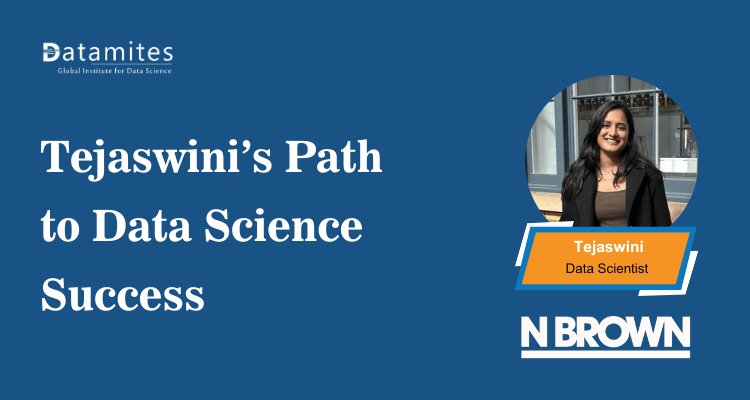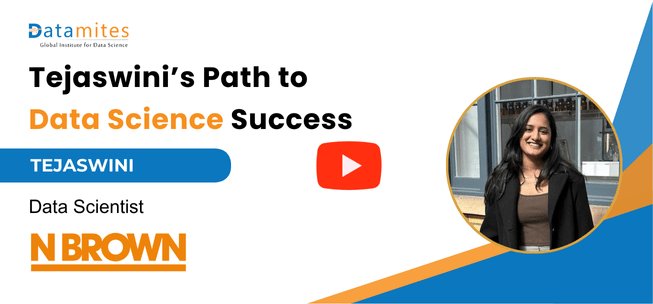Tejaswini’s Path to Data Science Success
Tejaswini’s journey shows how curiosity and persistence turned challenges into stepping stones. Her story offers practical lessons for anyone aiming to break into data science.

Breaking into data science can feel overwhelming. With countless algorithms to learn, tools to master, and messy datasets to decode, many beginners struggle to find direction. The real secret, though, isn’t cramming formulas, it’s persistence, problem-solving, and staying curious.
Her journey moves from early exposure to machine learning during engineering to structured training at DataMites and then a Master’s in the UK. With consistent effort and hands-on projects, she turned her passion into a career. Today, working as a data scientist at N Brown in the UK, she shares the hurdles she faced, the lessons learned, and the mindset that fueled her success. If you’re looking to watch data science success stories, Tejaswini’s path is one worth following.
Tejaswini’s Inspiring Data Science Journey with DataMites Institute
Discover how Tejaswini moved from computer science studies to mastering data science, completing real-world projects, and building a growing career with guidance from DataMites.
Q1. Can you walk us through your journey into data science?
During my final year of engineering, I worked on a machine learning project. It felt very new and exciting to predict outcomes using data. I started learning on YouTube, but it wasn’t structured. That’s when I joined DataMites. The six-month program, with two months of training and four months of projects, gave me a strong foundation. Later, I pursued a Master’s in the UK, which eventually led me to N Brown as a data scientist.
Q2. Were your classes at DataMites online or offline?
All my classes at DataMites were online, which made it easier to learn safely during COVID and still stay consistent with my studies.
Q3. How was your experience learning Python? Did you have any background in it?
Yes, I had a good background in Python and SQL because my engineering degree was in computer science. For me, the tough part wasn’t coding, it was understanding the math behind machine learning algorithms. DataMites really helped simplify those concepts.
Q4. What was your study pattern like during the course?
I attended the daily 2-hour sessions and then practiced on weekends since I was working at the time. I’d take the concepts from class, find datasets online, and experiment with them. That repetition made a big difference.
Q5. Did you use any external websites or resources while learning?
Mostly DataMites resources were enough. But I do recommend Kaggle. It’s great for practicing with new datasets and applying what you’ve learned.
Q6. Can you share the kind of projects you worked on during the course?
Our first project was on COVID-19 predictions, which was tough because the data was messy. We also worked on an insurance claim project. These projects taught us how to clean, analyze, and apply the right algorithms under mentor guidance.
Q7. What other topics beyond machine learning did you cover at DataMites?
We learned advanced data science, SQL, and BI tools. It was helpful to not just code but also understand the "why" behind each concept and how it fits in business scenarios.
Q8. How was your interview experience after completing the course?
Most questions were domain or scenario-based, like "Why did you choose this algorithm?" or "How would you handle big data?" There were also some basic Python and SQL questions, but the tougher part was domain knowledge and problem-solving.
Q9. Did interviewers ask about your projects?
Yes, especially about my COVID prediction project. They wanted to know how I cleaned the data, which algorithms I chose, and what challenges I faced.
Q10. How did you prepare for interviews?
First, I made sure I knew everything on my resume inside-out. Then, I practiced Python and SQL on platforms like LeetCode and HackerRank. Nowadays, I even use AI to generate potential interview questions from my resume and practice answers.
Q11. What’s your advice for resume building?
Follow the format of the country where you’re applying. Avoid spelling mistakes. You don’t need fancy tools, there are plenty of free templates online.
Q12. What does your current role at N Brown involve?
I’m part of the Decision Intelligence team. We build internal data products to support business decisions. Right now, I’m working on a model to predict Customer Lifetime Value (CLV), which helps guide marketing budgets and investments.
Q13. What tools and technologies do you use at work?
Python, SQL, and Power BI are must-haves. I also work with AWS, GCP, GitLab, and DevOps tools. Cloud platforms are central to my daily work.
Q14. What advice would you give freshers entering data science?
Understand the problem first. Don’t rush to use fancy algorithms. Be curious, ask questions, and master your basics. Practice with different datasets and know which algorithms fit which problems. Personally, I recommend mastering XGBoost, it’s versatile and reliable.
Q15. What platforms do you suggest for beginners to practice data science?
Kaggle is the best place to start. Beyond that, join LinkedIn communities, follow competitions, and use LeetCode or HackerRank for coding practice.
Q16. Is there scope for freshers in data science, given all the competition and talk about AI?
Definitely. Data science is not going anywhere. AI is growing, but traditional data science models are still crucial. Companies will always need data scientists. The key is to keep learning and stay adaptable.
Refer these articles:
- Altaf’s Path to Becoming a Senior Data Scientist
- How Darshan Shaped His Career Path in Data Science
- How Samir Built His Career as an NLP Data Scientist
Key Highlights from Tejaswini’s Data Science Journey
Tejaswini’s story shows how structured training, hands-on projects, and persistence can transform curiosity into a successful career in data science.
- A structured learning path, like the one offered at DataMites Institute, can provide the foundation needed to transition into data science.
- Hands-on projects (COVID-19 prediction, insurance claims, etc.) are crucial for building real-world problem-solving skills.
- Python, SQL, and Power BI remain essential tools in day-to-day data science work.
- Strong mathematical understanding of algorithms is often harder to master than coding, but it’s critical.
- Practicing on platforms like Kaggle, LeetCode, and HackerRank helps strengthen both coding and problem-solving.
- Resume clarity and knowing your listed projects inside-out are key for interview success.
- Interview questions often focus more on domain knowledge and scenario-based problems than on complex coding.
- Curiosity and problem understanding matter more than jumping straight to fancy algorithms.
- Algorithms like XGBoost are highly versatile and practical across many datasets.
- Data science careers require adaptability, especially with the rise of AI and cloud platforms (AWS, GCP).
- Freshers still have good opportunities in data science if they stay consistent, practice, and keep learning.
- Customer Lifetime Value (CLV) prediction is a growing application of data science in retail and business strategy.
- Work-life balance in data science roles can be strong, especially with hybrid and remote setups.
- Building a career in data science involves continuous learning, tools may evolve, but fundamentals remain.
- The demand for data scientists will remain strong over the next decade, even as AI advances.
Tejaswini’s journey shows that data science is driven by curiosity, problem-solving, and practice. Her advice is that focus on the basics, understand the problem, and keep learning through real-world projects and consistent effort.
Refer these articles:
- Data Science Course Fees in Bhubaneswar
- How to Become a Data Scientist in Bhubaneswar
- How to Become a Data Scientist in Kochi
- Data Science Course Fees in Kochi
Tejaswini’s journey proves that data science isn’t just a trending field, it’s one of the IT courses in demand and among the most rewarding career paths today. By mastering core skills, working on real-world projects, and staying consistent, she turned her passion into a successful profession. What this really shows is that anyone with curiosity and commitment can build a thriving career in data science. Her story isn’t just inspiring, it’s a roadmap for every aspiring data scientist.
If Tejaswini’s journey motivates you to explore data science, now is the right time to upskill. According to Precedence Research, the global data science platform market is projected to grow from USD 175.15 billion in 2025 to over USD 676.51 billion by 2034, at a CAGR of 16.20%. As businesses generate more and more data, the demand for skilled data professionals keeps rising. Choosing the right training institute that focuses on practical learning, real-time projects, and career guidance is crucial. Enrolling in a reputed data science course in Bhubaneswar, Mumbai, Bangalore, Chennai, Hyderabad, Pune, or Delhi can open doors to countless opportunities.
For Tejaswini, expert mentorship and structured training were the turning points in her journey. By diving deep into Data Science, Artificial Intelligence, Machine Learning, Python, and Data Analytics, and strengthening her skills through hands-on projects, she gained the confidence to excel in the field.
DataMites Institute also offers data science training in Kochi, Coimbatore, Ahmedabad, Chennai, Bangalore, Hyderabad, Pune, and Mumbai, along with flexible online programs, making high-quality education accessible to students, working professionals, and career switchers, just like it was for Tejaswini.

